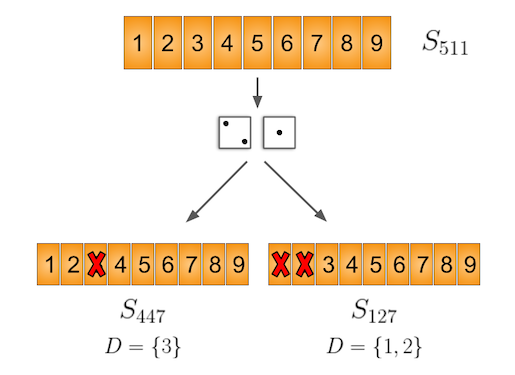Page Not Found
Page not found. Your pixels are in another canvas.
A list of all the posts and pages found on the site. For you robots out there is an XML version available for digesting as well.
Page not found. Your pixels are in another canvas.
About me
This is a page not in th emain menu
Published:
This post explores how Markov Chains can be used to probabilistically model games through an exploration of the game “Shut the Box”.


Short description of portfolio item number 1
Short description of portfolio item number 2 
Published in Proceedings of the AAAI Conference on Artificial Intelligence, 2020
Programming-by-example (PBE) is a synthesis paradigm that allows users to generate functions by simply providing input-output examples. While a promising interaction paradigm, synthesis is still too slow for realtime interaction and more widespread adoption. Existing approaches to PBE synthesis have used automated reasoning tools, such as SMT solvers, as well as works applying machine learning techniques. At its core, the automated reasoning approach relies on highly domain specific knowledge of programming languages. On the other hand, the machine learning approaches utilize the fact that when working with program code, it is possible to generate arbitrarily large training datasets. In this work, we propose a system for using machine learning in tandem with automated reasoning techniques to solve Syntax Guided Synthesis (SyGuS) style PBE problems. By preprocessing SyGuS PBE problems with a neural network, we can use a data driven approach to reduce the size of the search space, then allow automated reasoning-based solvers to more quickly find a solution analytically. Our system is able to run atop existing SyGuS PBE synthesis tools, decreasing the runtime of the winner of the 2019 SyGuS Competition for the PBE Strings track by 47.65% to outperform all of the competing tools.
Recommended citation: Morton, K., Hallahan, W., Shum, E., Piskac, R., & Santolucito, M. (2020). Grammar Filtering for Syntax-Guided Synthesis. Proceedings of the AAAI Conference on Artificial Intelligence, 34(02), 1611-1618. https://doi.org/10.1609/aaai.v34i02.5522
Published in European Conference on Computer Vision (ECCV), 2022
Video question answering is a challenging task that requires understanding jointly the language input, the visual information in individual video frames, as well as the temporal information about the events occurring in the video. In this paper, we propose a novel multi-stream video encoder for video question answering that uses multiple video inputs and a new video-text iterative co-tokenization approach to answer a variety of questions related to videos. We experimentally evaluate the model on several datasets, such as MSRVTT-QA, MSVD-QA, IVQA, outperforming the previous state-of-the-art by large margins. Simultaneously, our model requires only 67 GFLOPs, producing a highly efficient video question answering model.
Recommended citation: AJ Piergiovanni, Kairo Morton, Weicheng Kuo, Michael Ryoo, and Anelia Angelova. Video question answering with iterative video-text co-tokenization. ECCV, 2022.
Published:
This is a description of your talk, which is a markdown files that can be all markdown-ified like any other post. Yay markdown!
Published:
This is a description of your conference proceedings talk, note the different field in type. You can put anything in this field.
Undergraduate course, University 1, Department, 2014
This is a description of a teaching experience. You can use markdown like any other post.
Workshop, University 1, Department, 2015
This is a description of a teaching experience. You can use markdown like any other post.